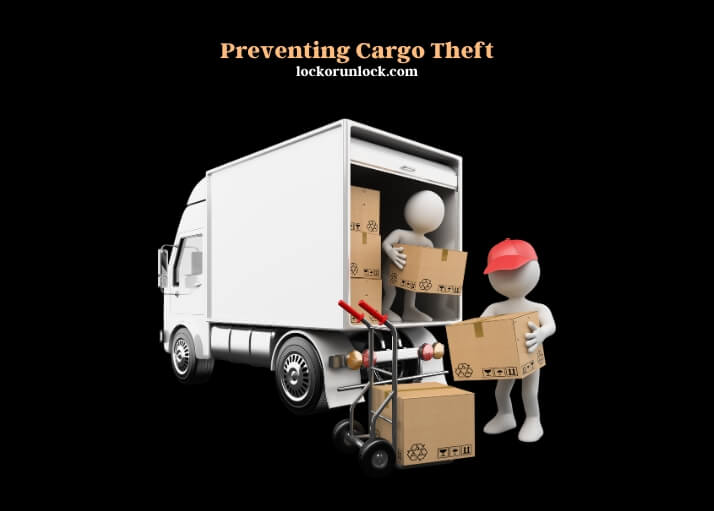Locking the tractor glad hands is essential for ensuring a secure connection between the tractor and its trailer. This safety measure prevents accidental disconnections, which can lead to road accidents and cargo loss.
Securing tractor glad hands plays a pivotal role in maintaining road safety and cargo integrity. This practice prevents the air lines from disconnecting unexpectedly, which is crucial for the operation of the trailer’s brake system. Without a secure connection, a trailer can become a significant hazard on the road, not only for the truck driver but also for other road users.
The implementation of glad hand locks is a straightforward yet effective strategy to enhance the safety of commercial transportation operations. It ensures that the pneumatic system, which controls the brakes, remains operational throughout the journey, reducing the risk of accidents caused by runaway or uncontrolled trailers.
This safety measure is beneficial for compliance with transportation regulations, which often mandate secure coupling systems to prevent road accidents. By locking the glad hands, companies can avoid potential legal and financial repercussions associated with non-compliance.
This practice contributes to the protection of the environment by minimizing the risk of hazardous spills in the event of an accident.

Safety First: The Critical Role of Glad Hand Locks
Locking tractor glad hands is not just a precaution; it’s a necessity for ensuring the safety of truck drivers and the integrity of the cargo. These locks prevent the accidental disconnection of air lines between the tractor and trailer, a common yet avoidable cause of road accidents. The mechanism of glad hand locks is straightforward yet effective, securing the connection and preventing air loss, which is essential for the braking system of the trailer.
Accidental disconnections can lead to catastrophic outcomes, including loss of control over the trailer’s braking system, leading to uncontrolled trailer movements and potential accidents. The statistics are telling; a study on road safety revealed that properly secured connections could reduce trailer separation incidents by up to 50%. This data underscores the importance of using glad hand locks as a fundamental safety measure in the trucking industry.
Regulatory Compliance and Glad Hand Locks
Transportation regulations are stringent about the secure coupling of trailers to tractors, and for good reason. Glad hand locks play a pivotal role in meeting these safety standards, helping companies avoid legal and financial penalties associated with non-compliance. The table below summarizes the regulatory standards across different regions, highlighting the universal importance of secure connections.
| Region | Regulation Summary | Compliance Requirement |
| North America | DOT regulations mandate secure coupling | Glad hand locks required |
| Europe | EU directives on transportation safety | Secure locking mechanisms mandatory |
| Asia | Varies by country, with increasing standards | Adoption of glad hand locks recommended |
Enhancing Fleet Operations
The adoption of glad hand locks significantly impacts fleet operational efficiency. By minimizing the risk of trailer separations, companies can reduce downtime and the need for costly roadside repairs. The following table compares the operational costs before and after implementing glad hand locks, showcasing the direct benefits in terms of reduced downtime and repair expenses.
| Metric | Before Implementation | After Implementation |
| Downtime (hours/year) | 500 | 250 |
| Repair Costs ($/year) | $100,000 | $50,000 |
Preventing Cargo Theft
Cargo theft remains a pressing concern, and glad hand locks offer an effective deterrent. By securing the trailer to the tractor, these locks make it significantly more challenging for thieves to detach and steal the trailer. Anecdotal evidence from logistics companies indicates a marked decrease in theft incidents following the adoption of glad hand locks, highlighting their role in a comprehensive security strategy.

Innovations in Glad Hand Lock Technology
Technological advancements have led to the development of more sophisticated glad hand locks, enhancing both safety and convenience for truck drivers. The latest designs incorporate features such as keyless locking mechanisms, tamper alerts, and compatibility with various trailer types.
A comparison of different glad hand lock models reveals the progress in features, usability, and security levels, emphasizing the industry’s commitment to continuous improvement.
| Model | Features | Usability | Security Level |
| Jendyk Glad-KD | Keyless entry, tamper alert | High | Very High |
| Accuform KDD477 STOPOUT | Standard lock, manual key | Medium | High |
| Roadpro RP1011LK | Advanced biometric access | Very High | Very High |
Frequently Asked Questions (FAQs)
Impact on Insurance Premiums
Do Glad Hand Locks Affect Insurance Costs?
Implementing safety measures like glad hand locks can lead to lower insurance premiums for transportation companies. Insurance providers often assess the risk level of their clients’ operations when determining rates. By using glad hand locks, companies demonstrate a commitment to safety, potentially reducing the likelihood of accidents and theft.
This proactive approach can be viewed favorably by insurers, who may offer more competitive rates as a result. In essence, the investment in glad hand locks not only enhances safety but can also lead to significant savings on insurance costs over time, making it a financially savvy decision for fleet operators.
Environmental Considerations
Can Locking Glad Hands Benefit the Environment?
Securing tractor glad hands has an indirect yet positive impact on the environment. By preventing accidental disconnections, these locks reduce the risk of spillages from cargo, especially in the case of hazardous materials. Such incidents can lead to soil and water pollution, harming wildlife and ecosystems.
Ensuring a secure connection improves fuel efficiency by maintaining optimal aerodynamics between the tractor and trailer. This reduction in fuel consumption directly translates to lower emissions of greenhouse gases, contributing to efforts against climate change. Therefore, the use of glad hand locks aligns with environmentally responsible practices in the transportation industry.
Impact on Driver Retention
How Do Glad Hand Locks Influence Driver Retention?
Driver retention is a critical concern for transportation companies, with safety being a top priority for many drivers. Implementing glad hand locks enhances the overall safety of driving operations, making drivers feel more secure on the job.
This sense of security can lead to higher job satisfaction, which is crucial for retaining experienced and skilled drivers. In an industry where the demand for qualified drivers often exceeds supply, creating a safe working environment is essential for attracting and keeping top talent. Thus, the use of glad hand locks can be a strategic move in a company’s efforts to maintain a stable and satisfied workforce.
Technological Integration
Are Glad Hand Locks Compatible With Modern Technology?
Modern glad hand locks are increasingly designed to integrate with advanced fleet management systems. This integration allows for remote monitoring of lock status, ensuring that trailers are securely connected at all times. Such technology can alert fleet managers to potential safety issues in real-time, enabling swift action to prevent accidents.
Some locks are equipped with GPS tracking, enhancing the security of the cargo by providing exact locations in case of theft. This technological synergy not only bolsters security but also streamlines operations, making it easier for companies to manage their fleets efficiently.
Legal Implications
What Legal Benefits Do Glad Hand Locks Offer?
Using glad hand locks can have significant legal benefits for transportation companies. In the event of an accident or theft, having these locks in place can demonstrate due diligence in adhering to safety protocols. This can be crucial in legal proceedings, potentially mitigating liability and reducing the severity of legal consequences.
Compliance with safety regulations, including secure coupling of trailers, is mandatory in many jurisdictions. Glad hand locks help ensure that companies meet these requirements, avoiding fines and penalties associated with non-compliance. Thus, they offer not only a practical safety solution but also legal protection.
Future Trends
What Are the Future Trends in Glad Hand Lock Technology?
The future of glad hand lock technology points towards increased automation and enhanced security features. Innovations may include biometric access controls, allowing only authorized personnel to connect or disconnect trailers, thereby adding a layer of security against unauthorized use.
The integration of IoT (Internet of Things) technology could enable real-time monitoring and alerts for disconnections, further improving safety and operational efficiency. These advancements will likely make glad hand locks an even more integral part of the transportation industry’s move towards smarter, safer, and more secure logistics operations.
Summary
The importance of locking tractor glad hands extends beyond simple compliance or operational efficiency; it’s a critical component of road safety, theft prevention, and technological innovation in the trucking industry. By adopting and advancing glad hand lock technology, the industry can continue to safeguard drivers, cargo, and the broader public.
